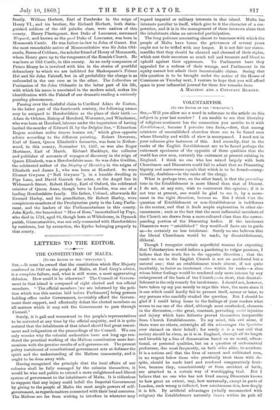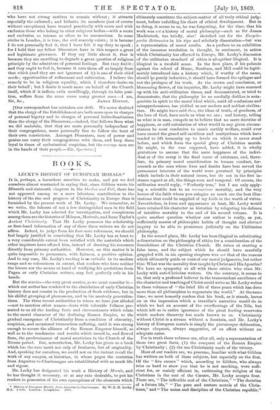VOLUNTARYISM.
[TO THE EDITOR OF THE "SPECTATOR?) SIR,—Will you allow nie a word in reference to the article on this
subject in your last number ? I am unable to see that liberality of religious sentiment has the connection you ascribe to it with Establishment, because I perceive two facts,—first, that among ministers of unestablished churches there are to be found men whose liberality and width of view is unsurpassed. I need not in your columns give instances of this. And secondly, that in the ranks of the English Establishment are to be found perhaps the extremest specimens of the opposite of these qualities that the world has ever seen, certainly the extremest at present existing in England. I think no one who has mixed largely with both Churchmen and Dissenters could fail to admit that no Dissenting bigotry and narrowness equals that which is to be found—excep- tionally, doubtless—in the ranks of the clergy.
What is perhaps true, on the other hand, is that the prevailing tone in the Establishment is more liberal than that of Dissent.
I do not, at any rate, wish to controvert this opinion ; if it is not true at present, one would be glad to see it, by a move- ment in the right direction, become so. But I think Viat the question of Establishment or non-Establishment is indifferent in the matter, and that it finds ample explanation in other cir- cumstances; such as the fact that the most influential members of the Church are drawn from amore cultured class than the corres- ponding portion of the Dissenting bodies. If the intolerant Dissenters were " established " they would—if facts are to guide us—be certainly no less intolerant. Surely no one believes that the liberal Churchmen would be made, by disestablishtnent, illiberal.
Though I recognize certain superficial reasons for expecting that Voluntaryism would induce a pandering to vulgar passions, I believe that the truth lies in the opposite direction ; that the result we see in the English Church is not an accidental but a natural one ; that an establishment tends almost, if not quite inevitably, to foster an intolerant class within its ranks—a class whose bitter feelings would be rendered only more intense by any enlargement of the basis of the Church ;—in short, that disestab- lishment is the only remedy for intolerance. I should not, however, have taken up my pen merely to urge this view, the more since it is one which could hardly fail to present itself, sooner or later, to any persons who candidly studied the question. But I should be glad if I could bring home to the feelings of your readers what seems to me one of the chief, although most overlooked, elements in the discussion,—the great, constant, pervading social injustice and injury which have hitherto proved themselves inseparable from Church Establishments. To my mind, this evil alone, if there were no others, outweighs all the advantages the Spectator ever claimed on their behalf ; for surely it is a vast evil that society should be riven, as it is in England, through all its length and breadth by a line of demarcation based on no moral, educa- tional, or personal qualities, but on a question of ecclesiastical preference, due most frequently, on both sides alike, to accident. It is a serious evil that the lives of earnest and cultivated men, in no respect below those who practically treat them with de- spite, should be made hard and rendered comparatively fruit- less, because they, conscientiously or from accident of birth, are attached to a certain way of worshipping God. But I believe that no one who has not lived among Dissenters knows to how great an extent, nay, how universally, except in parts of Loudon, such wrong is inflicted, bow mischievous it is, how deeply it is felt. By artificial advantages (wholly unconnected with religion) the Establishment naturally draws within its pale all 'who have not strong motives to remain without ; it attracts especially the cultured ; and hitherto its members (not of course without exceptions) have treated practically with scorn and with exclusion those who belong to other religious bodies—with a scorn and exclusion so intense as often to be unconscious. In some circles in London, it is true, the evil scarcely exists ; it is because I do not personally feel it, that I have felt it my duty to speak ; for I hold that my fellow Dissenters have in this respect a great and legitimate grievance. If they say little about it, that is because they are unwilling to degrade a great question of religious principle by the admixture of personal feelings. But they feel it ; and they ought to feel it, because it cuts them off so largely from that which (and they are not ignorant of it) is one of their chief needs ; opportunities of refinement and cultivation. I believe the remedy to be in religious equality, which I therefore desire on their behalf ; but I desire it much more on behalf of the Church itself, which if it inflicts evils unwillingly, through its false posi- tion, suffers from the same cause many greater ones.—I am,
(Our correspondent has mistaken our drift. We never doubted that the clergy of the Establishment are both more open to charges of personal bigotry and to charges of personal latitudinarianism than the clergy of the Dissenters,—indeed, that follows from what we did maintain, that they are more personally independent of their congregations, more personally free to follow the bent of their own convictions. Amongst Dissenters, men of power and genius can carry their congregations with them, and keep them loyal in times of ecclesiastical suspicion, but the average men are in the hands of their people.—ED. Spectator.]































 Previous page
Previous page